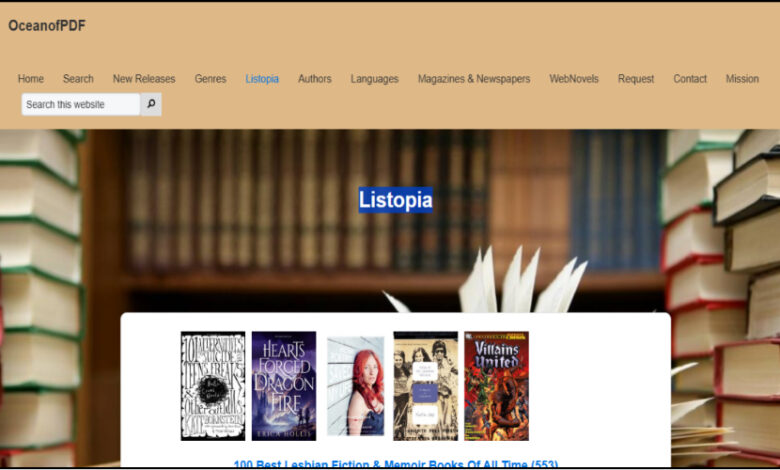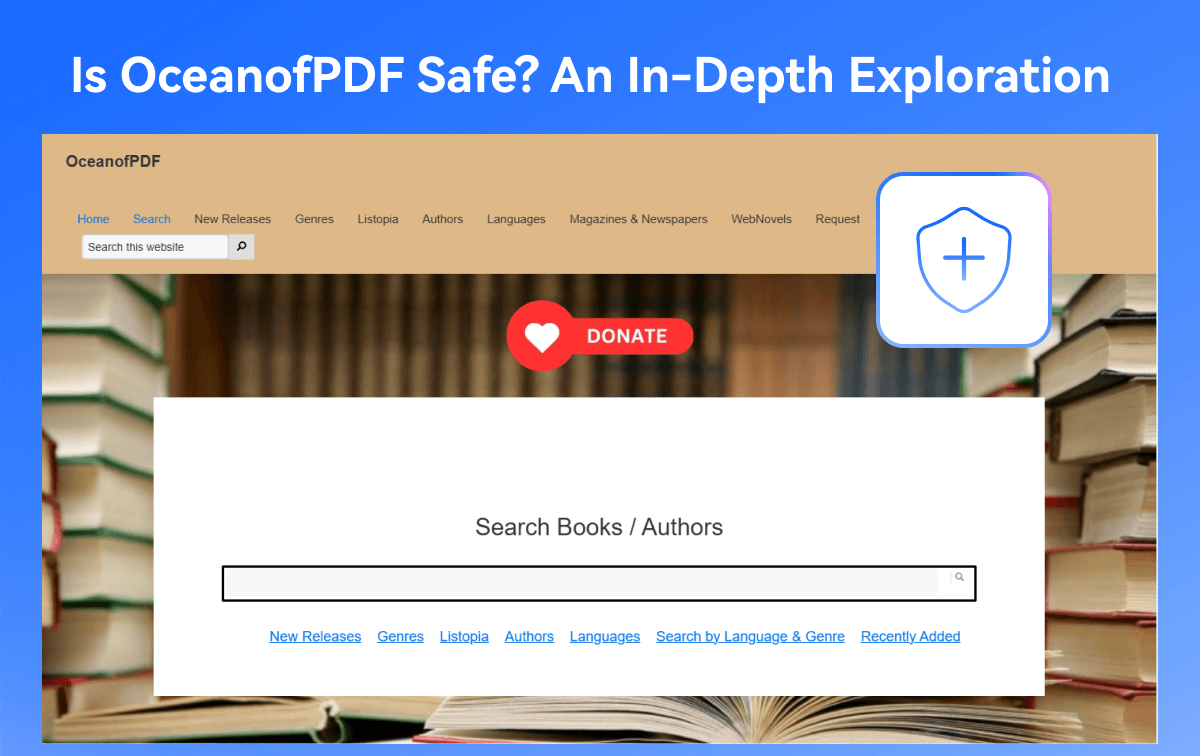OceanofPDF: The Rise, Popularity, and Controversy Around Free eBooks

Introduction: What is OceanofPDF and Why Was It So Popular?
OceanofPDF When you think about reading in the digital age, one of the first things that comes to mind is convenience. With smartphones, tablets, and e-readers, carrying hundreds of books has become effortless. Over the past decade, several websites have attempted to capitalize on this growing demand for eBooks. Among them, OceanofPDF became one of the most searched names on the internet.
OceanofPDF was a website that offered free downloads of eBooks across multiple genres. From bestselling novels to academic resources, it had an extensive collection that attracted millions of users worldwide. For readers who didn’t want to spend money on Kindle or other paid platforms, this site seemed like a dream come true.
But like many too-good-to-be-true platforms, OceanofPDF also came with controversy. While readers loved the access, publishers and authors raised strong concerns about copyright infringement. This tension between accessibility and legality is what made OceanofPDF both famous and notorious at the same time.
The Appeal of Free eBook Platforms

The success of OceanofPDF wasn’t random—it tapped into a real demand. Books can be expensive, especially for students or readers who consume large volumes each year. While libraries provide some relief, not everyone has access to them, and digital alternatives have become far more convenient.
Websites like OceanofPDF made reading more accessible. Someone in a small town with limited bookstores could suddenly download titles that were otherwise unavailable locally. The convenience of downloading a PDF directly to a device, without subscriptions or fees, gave OceanofPDF its global reach.
Additionally, the site’s wide range of genres—from romance to science fiction to business guides—meant it catered to almost every kind of reader. That inclusivity helped it build a loyal following, especially among younger audiences who are more digitally inclined.
The Controversy Around OceanofPDF
As popular as it was, OceanofPDF was also highly controversial. The main issue revolved around copyright infringement. Authors and publishers argued that the site distributed books without permission, which hurt their sales and undermined their creative rights. For many writers, book royalties are their primary source of income, so free, unauthorized distribution directly impacted their livelihood.
Publishing houses, especially in the United States and Europe, raised formal complaints and issued takedown notices. Several authors even spoke out on social media, asking readers not to use the site. This backlash eventually led to OceanofPDF being shut down multiple times, though clones and mirror sites often reappeared.
The controversy highlighted the ongoing debate between accessibility and legality. Readers wanted affordable access to knowledge and entertainment, while creators demanded fair compensation for their work. OceanofPDF ended up being a case study in this complex balancing act.
Why People Still Search for OceanofPDF
Despite the controversies and shutdowns, searches for OceanofPDF remain high. There are a few reasons for this. First, the site’s brand became synonymous with free eBooks. Even after its official closure, people kept looking for it, hoping to find working links or alternatives.
Second, many readers are still drawn to the idea of free access, especially in regions where books are costly or harder to obtain. OceanofPDF became more than just a site—it was almost a movement that symbolized the desire for open access to literature.
Lastly, the word-of-mouth legacy plays a big role. Online forums, social media groups, and book communities continue to mention OceanofPDF when discussing free reading resources. Its name has cemented itself as a keyword in the world of digital reading, much like how people refer to “Google” when talking about search engines in general.
Alternatives to OceanofPDF
While OceanofPDF may no longer operate as it once did, there are legitimate alternatives for readers who want free or affordable eBooks. Platforms like Project Gutenberg, Open Library, and Google Books offer thousands of titles legally and for free. These platforms focus on books that are either in the public domain or shared with the author’s consent.
For those who prefer more contemporary reads, subscription services such as Kindle Unlimited, Scribd, and Audible provide affordable access to large libraries of eBooks and audiobooks. While not entirely free, they strike a balance between accessibility and supporting authors.
Additionally, many independent authors release their work for free or at discounted rates on platforms like Smashwords or Wattpad. These sites allow readers to explore fresh voices while still respecting the creator’s rights. By turning to these alternatives, readers can continue to enjoy the convenience of digital reading without engaging in piracy.
The Impact of OceanofPDF on the Publishing Industry
OceanofPDF’s existence left a noticeable impact on the publishing world. On one hand, it raised awareness of the demand for affordable eBooks. Publishers realized that readers were willing to go to great lengths—even resorting to questionable sites—to access affordable literature. This pushed some companies to rethink their pricing strategies and explore subscription-based models.
On the other hand, it also highlighted the vulnerability of the digital publishing industry to piracy. As more books move into digital formats, protecting intellectual property becomes harder. OceanofPDF demonstrated just how quickly copyrighted material can spread online once it’s uploaded.
In some ways, the site acted as a wake-up call. Authors, publishers, and tech companies had to consider new approaches to balancing accessibility with compensation, such as watermarking, digital rights management, and new distribution models.
Lessons for Readers and the Digital World
For readers, the OceanofPDF saga is a reminder of the importance of ethical consumption. While it’s tempting to download free books, it’s equally important to support authors so they can continue creating. Choosing legal alternatives not only ensures that creators are compensated but also reduces the risks associated with downloading files from unverified sites, such as malware or data theft.
For the digital world, the story of OceanofPDF underscores the need for sustainable solutions. Instead of battling piracy endlessly, the publishing industry needs to create systems that make reading affordable and accessible to all. Just as streaming platforms changed the music and film industries, similar innovation is required in the world of books.
Ultimately, OceanofPDF’s rise and fall is a reflection of the ongoing transformation of how we consume literature in the 21st century. It raises important questions about fairness, accessibility, and the future of publishing.
Conclusion: The Legacy of OceanofPDF
While OceanofPDF may no longer exist in its original form, its impact is undeniable. For many readers, it was a gateway to a wider world of literature, offering access that might not have been possible otherwise. For publishers and authors, it was a challenge that forced them to confront the realities of digital piracy.
The legacy of OceanofPDF lies in its ability to spark conversations about the value of knowledge, the rights of creators, and the demand for accessible reading. It may have been controversial, but it also showed the publishing industry that readers are hungry for affordable access to books.
As we move forward, the lessons from OceanofPDF will continue to influence how books are published, priced, and shared. And for readers, it’s a reminder that while free access feels convenient, supporting creators is what ensures that great stories keep getting written in the first place.



